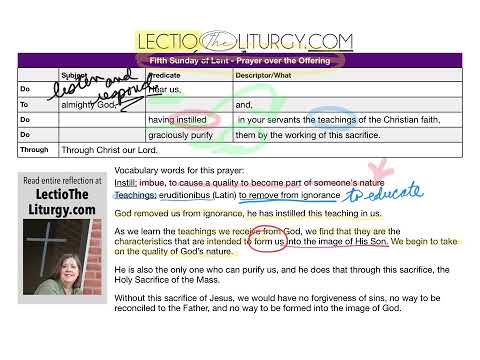5th Sunday of Lent Prayer over the Offerings
I find it interesting to come across words that don’t mean what I think they mean. Needless to say, I found this prayer to be a lot of fun and yet have a lot to think about. This week we Lectio the Liturgy with the Prayer over the Offering for the 5th Sunday of Lent.
Hear us, almighty God, and, having instilled in your servants the teachings of the Christian faith, graciously purify them by the working of this sacrifice. Through Christ our Lord.
Let’s start with the word “hear.” More than just a simple request to listen, we are asking God to respond to our request.
Next, we acknowledge that God has instilled in us the teachings of the Christian faith.
The word “teachings” has a surprise definition. A teaching is something that we learn from, right? In the context of this prayer, the answer is both yes and no.
The word used here does not refer to a teaching as in religious education classes or doctrines, however it does refer to learning.
In the Latin form of the prayer, the word for teaching is eruditionibus. It's root word means to remove from ignorance, to educate.
Not only has God removed us from ignorance, or removed ignorance from us, he has instilled His teaching in us. To instill means to imbue, to cause a quality to become part of someone's nature. I was trying to think of an example, and this may seem like a silly one, but here goes… It’s like making pickles. The seasoning of the brine is infused into the cucumber. They can no longer be separated, the cucumber becomes more than it was before, it has a different nature.
Believe me, I spent no little time pondering this one (you can probably tell that by the pickle example). I thought back to the beginning of the Old Testament, how God revealed himself little by little. How he taught His people one step at a time and how patiently he revealed to them that they were His people and He was their God.
He does the same for us. He is love, He is patient, He is kind. As we learn the teachings we receive from God, we find that they are the characteristics that are intended to form us into the image of His Son. We begin to take on the quality of God’s nature.
God is the one who prepares us and teaches us. He is also the only one who can purify us, and he does that through this sacrifice, the Holy Sacrifice of the Mass.
The Mass makes present the mystery of Jesus’ death on the cross. Without this sacrifice of Jesus, we would have no forgiveness of sins, no way to be reconciled to the Father, and no way to be formed into the image of God.
Instilling the teachings and being purified by the working of the sacrifice is the work of the Mass. We hear, learn, and respond to God as we listen to the scriptures, the Liturgy of the Word. We become present in and a part of the sacrifice that Jesus made to the Father in the Liturgy of the Eucharist.
By now you may be thinking, "Then why didn’t they just write the prayer to say that?" and that’s a good question. My only answer is this: There is a difference between just reading a passage of scripture and meditating on it and there is a difference between knowing Jesus and sitting as His feet. As we study the prayers of the Roman Missal, we are joined in prayer with centuries of Christians who now, from Heaven, pray with us and I, like them, want God’s teachings to become not just a part of me, but I want to be transformed into them. I want to be made holy, and as we confess in the Penitential Act, “I ask blessed Mary ever-Virgin, all the Angels and Saints, and you, my brothers and sisters, to pray for me to the Lord our God.” Know that I am praying for you, as well.
Thank you for joining me,
Julie
